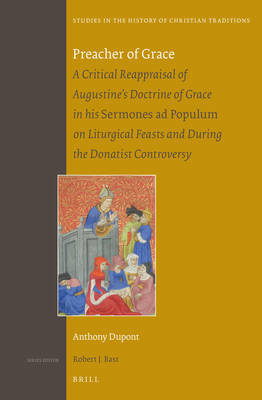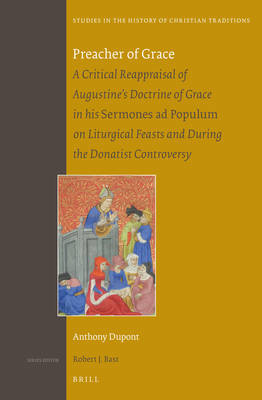
- Afhalen na 1 uur in een winkel met voorraad
- Gratis thuislevering in België vanaf € 30
- Ruim aanbod met 7 miljoen producten
- Afhalen na 1 uur in een winkel met voorraad
- Gratis thuislevering in België vanaf € 30
- Ruim aanbod met 7 miljoen producten
Zoeken
Preacher of Grace
A Critical Reappraisal of Augustine's Doctrine of Grace in His Sermones AD Populum on Liturgical Feasts and During the Donatist Controversy
Anthony DuPont
€ 264,45
+ 528 punten
Omschrijving
Augustine of Hippo (354-430) became known as the 'doctor of grace'. He developed his theory of divine grace mainly in his systematic treatises directed against the Pelagians (ca. 411-430). Did he however also preach about this complex, and at first sight 'demoralizing', issue in his sermons to the people? In his previous book (BSCH 59), Anthony Dupont studied the profile of the treatment of gratia in the anti-Pelagian sermones ad populum. In a Preacher of Grace Dupont offers an account of the presence of the theme of grace in Augustine's sermones not situated in the Pelagian controversy. He first studies sermons preached on important liturgical feasts, which belong to the (non-polemical) pastoral preaching genre. They are distributed throughout the 40 years of Augustine's preaching activity, and are Christological in content and moralising in intention. Secondly, he examines sermons situated in the Donatist controversy, preceding the anti-Pelagian sermons chronologically and differing from them in terms of content. This research provides a global picture of the presence and treatment of gratia in Augustine's sermones and clarifies the interaction between context, audience and preaching genre on the one hand, and the theme of grace as a whole on the other. It also contributes to the debate on (dis)continuity in Augustine's thought on grace.
Specificaties
Betrokkenen
- Auteur(s):
- Uitgeverij:
Inhoud
- Aantal bladzijden:
- 246
- Taal:
- Engels
- Reeks:
- Reeksnummer:
- nr. 177
Eigenschappen
- Productcode (EAN):
- 9789004278639
- Verschijningsdatum:
- 18/07/2014
- Uitvoering:
- Hardcover
- Formaat:
- Genaaid
- Afmetingen:
- 160 mm x 241 mm
- Gewicht:
- 517 g

Alleen bij Standaard Boekhandel
+ 528 punten op je klantenkaart van Standaard Boekhandel
Beoordelingen
We publiceren alleen reviews die voldoen aan de voorwaarden voor reviews. Bekijk onze voorwaarden voor reviews.








